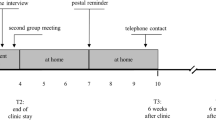Abstract
This study examined the separate and combined effects of verbal (cognitive) therapy and aerobic exercise for the treatment of individuals experiencing difficulties coping with dysphoric moods. Sixty-one volunteers who scored between 9 and 30 on the Beck Depression Inventory were randomly assigned to one of three conditions: running only, cognitive therapy only, or combined running and therapy. Cognitive therapy was provided in 10 weekly individual sessions, while supervised running was conducted in small groups three times a week for 10 weeks. All three treatment conditions produced significant but not differential improvement over time on measures assessing a variety of mood states. Posthoc analyses demonstrated that all treatments were equally effective for individuals who initially would have been considered to be mildly depressed (BDI < 20) and those who would have been considered moderately depressed (BDI ≥ 20). Four-month follow-up data indicated that the improvement had been maintained. The correlation between improvement on depression scores and an index of improved physiological functioning was not significant. Thus, the mechanism through which exercise influences mood was not clarified. These results suggest that supervised involvement in aerobic exercise may be a viable and cost-efficient alternative treatment to traditional individual verbal therapy for some individuals experiencing difficulty with dysphoric moods.
Similar content being viewed by others
References
Beck, A. T., Ward, C. H., Mendelsohn, M., Mock, J., & Erbaugh, J. (1961). An inventory for measuring depression.Archives of General Psychiatry, 35 837–844.
Brown, R. S., Ramirez, D. E., & Taub, J. M. (1978). The prescription of exercise for depression.Physician and Sports Medicine, 6 35–45.
Burns, D. D. (1980).Feeling good: The new mood therapy. New York: Signet.
Cooper, K. (1970).The new aerobics. New York: Lippincott.
Craighead, W. E. (1981). Issues resulting from treatment studies. In L. P. Rehm (Ed.),Behavior therapy for depression: Present status and future directions (pp. 73–96). New York: Academic Press.
Doyne, E. J., Chambless, D., & Beutler, L. E. (1983). Aerobic exercise as a treatment for depression in women.Behavior Therapy, 14 434–440.
Folkins, C. H., Lynch, S., & Gardner, M. M. (1972). Psychological fitness as a function of physical fitness.Archives of Physical Medicine and Rehabilitation, 53 503–508.
Folkins, C. H., & Dime, W. E., (1981). Physical fitness training and mental health.American Psychologist, 36 373–389.
Getchell, B. (1976).Physical fitness: A way of life. New York: Wiley.
Greist, J. H., Klein, M. H., Eischens, R. R., Faris, J., Gurman, A. S., & Morgan, W. P. (1979). Running as a treatment for depression.Comprehensive Psychiatry, 20(1), 41–54.
Hilyer, J. C., & Mitchell, W. (1979). Effect of systematic physical fitness training combined with counseling on the self-concept of college students.Journal of Counseling Psychology, 26(5), 427–436.
Hollon, S. D. (1981). Comparison and combinations with alternative approaches. In. L. P. Rehm (Ed.),Behavior therapy for depression: Present status and future directions. New York: Academic Press.
Kovacs, M. (1980). The efficacy of cognitive and behavior therapies for depression.American Journal of Psychiatry, 137(12), 1445–1501.
Last, C. G., Thase, M. E., Hersen, M., Bellack, A. S., & Himmelhoch, J. M. (1984). Treatment outcome for solicited versus nonsolicited unipolar depressed female outpatients.Journal of Consulting and Clinical Psychology, 52(1), 134.
McNair, D. M., & Lorr, M. (1964). An analysis of mood in neurotics.Journal of Abnormal Social Psychology, 69 620–627.
Morgan, W. P., Roberts, J. A., Brand, F. R., & Feinerman, A. D. (1970). Psychological effect of chronic physical activity.Medicine and Science in Sports, 2 213–217.
Oliver, J. M., & Simmons, M. E. (1984). Depression as measured by the DSM-III and the Beck Depression Inventory in an unsolicited adult population.Journal of Consulting and Clinical Psychology, 52(5), 892–898.
Rehm, L. P. (Ed.). (1981).Behavior therapy for depression: Present status and future directions. New York: Academic Press.
Sachs, M. L., & Buffone, G. W. (1984).Running as therapy. Lincoln: University of Nebraska Press.
Sacks, M. H., & Sachs, M. L. (1981).Psychology of running. Champaign, Illinois: Human Kinetics Publishers.
Shaw, B. F. (1977). Comparison of cognitive therapy and behavior therapy in the treatment of depression.Journal of Consulting and Clinical Psychology, 45(4), 453–551.
Spielberger, C. D., Gorsuch, R. L., & Lushene, R. E. (1970).Manual for State-Trait Anxiety Inventory. Palo Alto: Consulting Psychologists Press.
Stoppard, J. M., and Thompson, E. (1981, November).Self-help bibliotherapy for depression: A controlled evaluation. Paper presented at the meeting of the Association for the Advancement of Behavior Therapy, Toronto.
Weinstein, W. S., & Meyers, A. W. (1983). Running as treatment for depression: Is it worth it?Journal of Sport Psychology, 5 288–301.
Author information
Authors and Affiliations
Additional information
This article is based on Jeffrey Fremont's doctoral dissertation, which was conducted under the supervision of Linda W. Craighead at The Pennsylvania State University.
Rights and permissions
About this article
Cite this article
Fremont, J., Craighead, L.W. Aerobic exercise and cognitive therapy in the treatment of dysphoric moods. Cogn Ther Res 11, 241–251 (1987). https://doi.org/10.1007/BF01183268
Issue Date:
DOI: https://doi.org/10.1007/BF01183268




